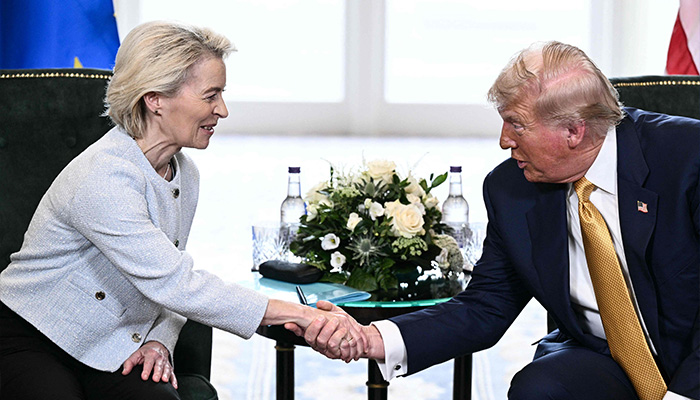
US President Donald Trump and EU chief Ursula von der Leyen Sunday announced they had reached a deal to end a transatlantic tariffs standoff and avert a full-blown trade war.
The agreement came as the clock ticked down on an August 1 deadline for the European Union to strike a deal with Washington — or face an across-the-board US levy of 30%.
“We have reached a deal. It’s a good deal for everybody,” Trump told reporters following a high-stakes meeting with von der Leyen at his golf resort in Turnberry, Scotland.
Trump told reporters the deal involved a baseline levy of 15% on EU exports to the United States — the same level secured by Japan — including for the bloc’s crucial auto sector, which is currently being taxed at 25%.
“We are agreeing that the tariff straight across, for automobiles and everything else, will be a straight across tariff of 15%,” Trump said.
He also said the bloc had agreed to purchase “$750 billion worth of energy” from the United States, as well as $600 billion more in additional investments in the country.
Negotiating on behalf of the EU’s 27 countries, von der Leyen’s European Commission had been pushing hard to salvage a trading relationship worth an annual $1.9 trillion in goods and services.
“It’s a good deal,” the EU chief told reporters, sitting alongside Trump following their hour-long talks.
“It will bring stability. It will bring predictability. That’s very important for our businesses on both sides of the Atlantic,” she said.
No carve-outs
The EU has been hit by multiple waves of tariffs since Trump reclaimed the White House. It is currently subject to a 25% levy on cars, 50% on steel and aluminium, and an across-the-board tariff of 10%, which Washington threatens to hike to 30% in a no-deal scenario.
Brussels has been focused on getting a deal to avoid sweeping tariffs that would further harm its sluggish economy — with retaliation held out as a last resort.
But the deal as outlined by Trump appeared to fall short of EU expectations.
The bloc had been pushing hard for tariff carve-outs for critical industries from aircraft to spirits, and its auto industry, crucial for France and Germany, is already reeling from the levies imposed so far.
Any deal will also need to be approved by EU member states — whose ambassadors, on a visit to Greenland, were updated by the commission Sunday morning. They were set to meet again after the deal struck in Scotland.
Trump said pharmaceuticals — a key export for Ireland, which the bloc has lobbied to shield — “won’t be part of” any deal.
“We have to have them built, made in the United States,” the president said. This month, Trump suggested the possibility of a 200% tariff on drugs imported into the United States, which would deal a crushing blow to the sector in Europe.
The EU had also hoped for a compromise on steel that could allow a certain quota into the United States before tariffs would apply, but Trump ruled that out, saying steel was “staying the way it is”.
Auto sector
While 15% would be much higher than pre-existing US tariffs on European goods, which average around 4.8%, it would mirror the status quo, with companies currently facing an additional flat rate of 10%.
Had the talks failed, EU states had greenlit counter tariffs on $109 billion (93 billion euros) of US goods including aircraft and cars to take effect in stages from August 7. Brussels was also drawing up a list of US services to potentially target.
Beyond that, countries including France say Brussels should not be afraid to deploy a so-called trade “bazooka” — EU legislation designed to counter coercion that can involve restricting access to its market and public contracts.
Trump has embarked on a campaign to reshape US trade with the world, and has vowed to hit dozens of countries with punitive tariffs if they do not reach a pact with Washington by August 1.
US Commerce Secretary Howard Lutnick had said Sunday the August 1 deadline was firm and there will be “no extensions, no more grace periods”.











